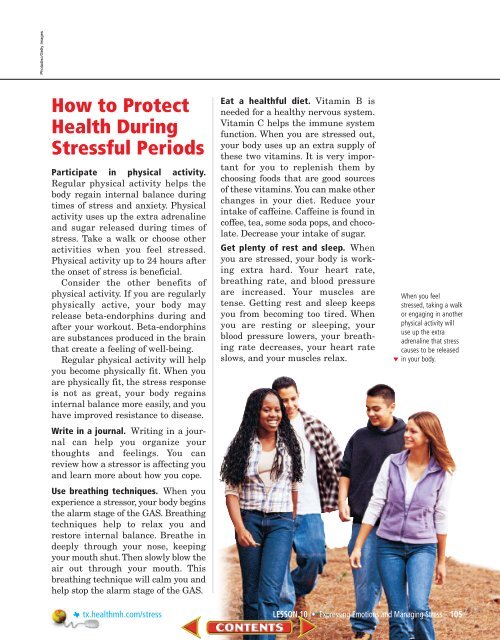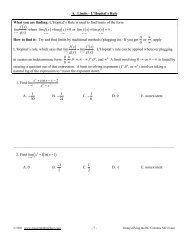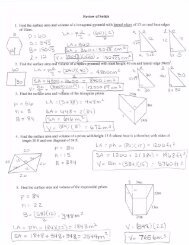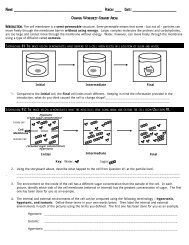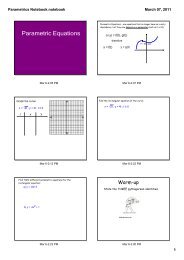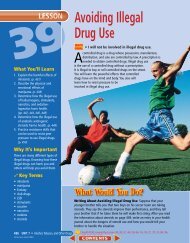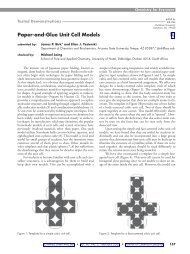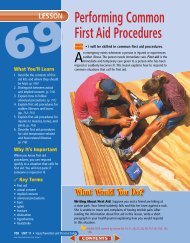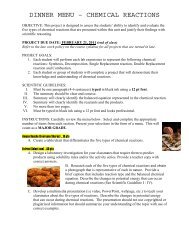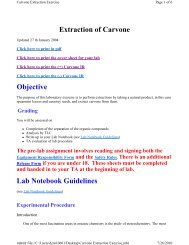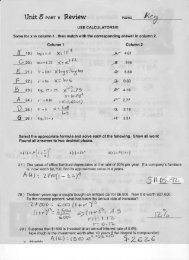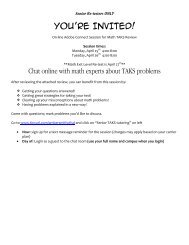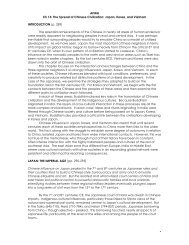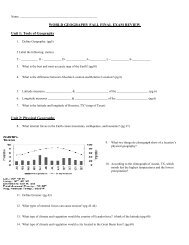Lesson 10 Expressing Emotions and Managing Stress - Epsilen
Lesson 10 Expressing Emotions and Managing Stress - Epsilen
Lesson 10 Expressing Emotions and Managing Stress - Epsilen
You also want an ePaper? Increase the reach of your titles
YUMPU automatically turns print PDFs into web optimized ePapers that Google loves.
Photodisc/Getty Images<br />
How to Protect<br />
Health During<br />
<strong>Stress</strong>ful Periods<br />
Participate in physical activity.<br />
Regular physical activity helps the<br />
body regain internal balance during<br />
times of stress <strong>and</strong> anxiety. Physical<br />
activity uses up the extra adrenaline<br />
<strong>and</strong> sugar released during times of<br />
stress. Take a walk or choose other<br />
activities when you feel stressed.<br />
Physical activity up to 24 hours after<br />
the onset of stress is beneficial.<br />
Consider the other benefits of<br />
physical activity. If you are regularly<br />
physically active, your body may<br />
release beta-endorphins during <strong>and</strong><br />
after your workout. Beta-endorphins<br />
are substances produced in the brain<br />
that create a feeling of well-being.<br />
Regular physical activity will help<br />
you become physically fit. When you<br />
are physically fit, the stress response<br />
is not as great, your body regains<br />
internal balance more easily, <strong>and</strong> you<br />
have improved resistance to disease.<br />
Write in a journal. Writing in a journal<br />
can help you organize your<br />
thoughts <strong>and</strong> feelings. You can<br />
review how a stressor is affecting you<br />
<strong>and</strong> learn more about how you cope.<br />
Use breathing techniques. When you<br />
experience a stressor, your body begins<br />
the alarm stage of the GAS. Breathing<br />
techniques help to relax you <strong>and</strong><br />
restore internal balance. Breathe in<br />
deeply through your nose, keeping<br />
your mouth shut. Then slowly blow the<br />
air out through your mouth. This<br />
breathing technique will calm you <strong>and</strong><br />
help stop the alarm stage of the GAS.<br />
tx.healthmh.com/stress<br />
Eat a healthful diet. Vitamin B is<br />
needed for a healthy nervous system.<br />
Vitamin C helps the immune system<br />
function. When you are stressed out,<br />
your body uses up an extra supply of<br />
these two vitamins. It is very important<br />
for you to replenish them by<br />
choosing foods that are good sources<br />
of these vitamins. You can make other<br />
changes in your diet. Reduce your<br />
intake of caffeine. Caffeine is found in<br />
coffee, tea, some soda pops, <strong>and</strong> chocolate.<br />
Decrease your intake of sugar.<br />
Get plenty of rest <strong>and</strong> sleep. When<br />
you are stressed, your body is working<br />
extra hard. Your heart rate,<br />
breathing rate, <strong>and</strong> blood pressure<br />
are increased. Your muscles are<br />
tense. Getting rest <strong>and</strong> sleep keeps<br />
you from becoming too tired. When<br />
you are resting or sleeping, your<br />
blood pressure lowers, your breathing<br />
rate decreases, your heart rate<br />
slows, <strong>and</strong> your muscles relax.<br />
When you feel<br />
stressed, taking a walk<br />
or engaging in another<br />
physical activity will<br />
use up the extra<br />
adrenaline that stress<br />
causes to be released<br />
in your body.<br />
LESSON <strong>10</strong> • <strong>Expressing</strong> <strong>Emotions</strong> <strong>and</strong> <strong>Managing</strong> <strong>Stress</strong> <strong>10</strong>5


